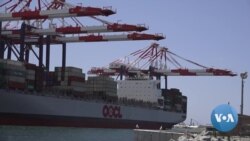Hello and welcome to VOA Asia Weekly. I'm Chris Casquejo in Washington, DC.
Making headlines across Asia.
Philippine authorities are struggling to distribute aid after a typhoon killed more than 100 people and displaced thousands.
Rohingya refugees say authorities have razed their camps in Indian Kashmir.
Thousands marched in Indonesia after hearing the government might postpone the 2024 presidential election.
Sri Lankan protesters want the president to step down over his handling of the nation’s economic crisis.
China is urging U.S. House Speaker Nancy Pelosi to cancel a trip to Taiwan.
Demonstrators in Japan railed against government plans to dump nuclear-contaminated water from the Fukushima power plant into the Pacific Ocean.
And those are your top Asia headlines.
Some residents in the Chinese financial hub Shanghai were able to leave their homes for the first time in more than two weeks.
Officials say about 4.8 million of Shanghai's 25 million residents had been classified as lower-risk after no new infections for 14 days.
With a quarter of the population under "full or partial lockdowns," China's leadership is taking steps to ease the economic toll of its "zero-COVID" strategy but remains reluctant to risk larger waves of infection.
The war in Ukraine and sanctions on Russia are causing even more stress in an already strained global supply chain brought on by the pandemic. VOA’s Elizabeth Lee has more on what this means for consumers and their wallets around the world.
Farming isn’t easy. Like all farmers, Chuck Fry is at the mercy of the weather. But he never expected to have problems due to a pandemic and now, a war in Ukraine.
Fry is a dairy farmer. But he also grows crops including barley and alfalfa. Most of it goes to feeding his cows. This planting season, the cost of doing business has skyrocketed.
The problem started when the pandemic disrupted production and shipping. Then Russia – which produces many fertilizer ingredients - invaded Ukraine. That triggered more shipping disruptions, panic buying, hoarding and other problems.
The entire global supply chain slowed, much like highway traffic, says economist Chris Tang.
"The disruption is like someone, they step on the gas, and someone step(s) on the brake."
Even before the most recent challenges, farmers were already experiencing disruptions in the global supply chain because of the pandemic. They say they were having a hard time finding medicines for their livestock because much of it comes from China.
Container ships loaded with cargo from Asia were stacked up at U.S. ports last year. A trucker shortage further delayed deliveries of goods.
More recently, COVID-19 cases have surged in China, prompting temporary lockdowns and plant closures. Observers expect disruptions at the world’s largest container port in Shanghai, causing a ripple effect globally.
Back at the dairy farm, Fry says he’s had to raise his ice cream prices by 10 percent.
Like many farmers, Fry says he may have to cut back production to offset rising prices and keep the farm that has been in his family since the 1800s.
Elizabeth Lee, VOA News, Frederick, Maryland.
Stay up to date with VOA Asia. Please follow us on Facebook, Twitter, Instagram and YouTube at VOA Asia. Our website is voanews.com. This is VOA Asia Weekly.
One of South Korea’s biggest food brands, Peacock, said that the price of its packaged Kimchi has increased by 6.5 percent this month because ingredients such as cabbage and ginger cost more.
In Japan, restaurants are raising prices because of a similar hike in ingredient food costs.
Consumer prices in Japan's capital rose at the fastest pace in more than two years in March.
Finally on VOA Asia Weekly, plunging prices for Russian crab have South Koreans heading to seafood markets and restaurants.
But others are avoiding the cheap crustaceans because they don’t want to indirectly support Russia.
Prices of Russian crabs have dropped in half since late February when the U.S., European Union, and other countries banned Russian seafood imports.
Now many South Koreans are urging their government to do the same.
That’s all the time we have here on VOA Asia Weekly.
Thank you for joining us. I’m Chris Casquejo. Please be sure to join us again next week.












